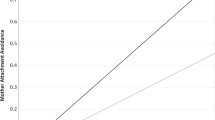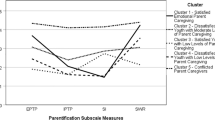Abstract
Impairment in the psychological balance between autonomy and connectedness––referred to as dysfunctional individuation––can interfere with wellbeing and contribute to mental health difficulties. Dysfunctional individuation may reflect problems in earlier parent-child relations, and may account for the relationship between such experiences and psychological distress. However, the prominence of dysfunctional individuation emergent from parental responsiveness, and its link with distress symptoms, may differ according to age and gender. The present study examined associations between perceived parental support, psychological distress, and dysfunctional individuation––including the mediating effect of the latter––among outpatients seeking mental health care. Moderation by age and gender was also examined. A sample of 219 patients completed study assessments. Correlations and conditional process modelling examined associations, including indirect effects of parental responsiveness, with moderation by age and gender, on psychological distress through dysfunctional individuation as a mediator. A significant three-way interaction was observed between perceived parental responsiveness, age, and gender in relation to dysfunctional individuation. Examination of mediation revealed significant moderated moderated mediation, in that the indirect effects of parental responsiveness––through dysfunctional individuation––were significant for younger women and older men. These findings indicated conditional age and gender effects on the role of dysfunctional individuation in mediating perceived early parental responsiveness and psychological distress. Thus, dysfunctional individuation may be a salient clinical concern among patients––particularly younger women and older men––with histories of diminished parental responsiveness. Further research is needed to clarify individuation-related difficulties with respect to age, gender, and other social and contextual factors.

Similar content being viewed by others
References
Aafjes-van Doorn, K., McCollum, J., Silberschatz, G., Kealy, D., & Snyder, J. (2020a). Perceived adverse parenting in childhood and psychological distress among psychotherapy Patients: The Mediating Role of Pathogenic Beliefs. Journal of Nervous and Mental Disease, https://doi.org/10.1097/NMD.0000000000001274.
Aafjes-van Doorn, K., Kamsteeg, C., & Silberschatz, G. (2020b). Cognitive mediators of the relationship between adverse childhood experiences and adult psychopathology: A systematic review. Development and Psychopathology, 32, 1017–1029. https://doi.org/10.1017/S0954579419001317.
Blatt, S. J. (2008). Polarities of experience: Relatedness and self-definition in personality development, psychopathology, and the therapeutic process. American Psychological Association.
Blos, P. (1979). Adolescent passage. International Universities Press.
Brim, O. G., Ryff, C. D., & Kessler, R. C. (2004). The MIDUS National Survey: An overview. In O. G. Brim, C. D. Ryff, & R. C. Kessler (Eds.), The John D. and Catherine T. MacArthur foundation series on mental health and development. Studies on successful midlife development. How healthy are we?: A national study of well-being at midlife (p. 1–34). University of Chicago Press.
Crawford, M., & Unger, R. (2004). Women and gender: A feminist psychology (4th ed.). McGraw-Hill.
Delhaye, M., Kempenaers, C., Linkowski, P., Stroobants, R., & Goossens, L. (2012). Perceived parenting and separation-individuation in Belgian college students: Associations with emotional adjustment. Journal of Psychology, 146, 353–370. https://doi.org/10.1080/00223980.2011.637996.
Eells, T. D. (Ed.). (1997). Handbook of psychotherapy case formulation. Guilford Press.
Gazzillo, F., Dimaggio, G., & Curtis, J. T. (2019). Case formulation and treatment planning: How to take care of relationship and symptoms together. Journal of Psychotherapy Integration. https://doi.org/10.1037/int0000185.
Gazzillo, F., Dazzi, N., Kealy, D., & Cuomo, R. (2020). Personalizing psychotherapy for personality disorders: Perspectives from control-mastery theory. Psychoanalytic Psychology. https://doi.org/10.1037/pap0000295.
Hayes, A. F. (2018). Introduction to mediation, moderation, and conditional process analysis: A regression-based approach. Guilford Press.
Hilsenroth, M. J., & Pitman, S. R. (2019). Working with cyclical relational patterns in contemporary psychodynamic psychotherapy. In D. Kealy & J. Ogrodniczuk (Eds.) Contemporary Psychodynamic Psychotherapy (pp. 19–31). Academic Press.
Holmbeck, G. N., & Leake, C. (1999). Separation-individuation and psychological adjustment in late adolescence. Journal of Youth and Adolescence, 28, 563–581. https://doi.org/10.1023/A:1021654626328.
Karataş, S., Levpušček, M. P., & Komidar, L. (2019). Demographic factors and individuation in relation to parents predicting attachment avoidance and anxiety in Turkish emerging adults. Current Psychology, 38, 1443–1455. https://doi.org/10.1007/s12144-017-9691-8.
Kavčič, T., & Zupančič, M. (2019). Types of separation-individuation in relation to mothers and fathers among young people entering adulthood. Journal of Youth Studies, 22, 66–86. https://doi.org/10.1080/13676261.2018.1478070.
Kealy, D., Sierra-Hernandez, C. A., & Ogrodniczuk, J. S. (2016). Childhood emotional support and borderline personality features in a sample of Canadian psychiatric outpatients. International Journal of Social Psychiatry, 62, 452–454. https://doi.org/10.1177/0020764016650214.
Kealy, D., Ben-David, S., & Cox, D. W. (2020a). Early parental support and meaning in life among young adults: The mediating roles of optimism and identity. Current Psychology. https://doi.org/10.1007/s12144-020-00907-w.
Kealy, D., Laverdière, O., Cox, D. W., & Hewitt, P. L. (2020b). Childhood emotional neglect and depressive and anxiety symptoms among mental health outpatients: The mediating roles of narcissistic vulnerability and shame. Journal of Mental Health., 1–9. https://doi.org/10.1080/09638237.2020.1836557.
Kealy, D., Rice, S. M., & Cox, D. W. (2020c). Childhood adversity and depressive symptoms among young adults: Examining the roles of individuation difficulties and perceived social support. Early Intervention in Psychiatry, 14, 241–246. https://doi.org/10.1111/eip.12894.
Kessler, R. C., Barker, P. R., Colpe, L. J., Epstein, J. F., Gfroerer, J. C., Hiripi, E., Howes, M. J., Normand, S. T., Manderscheid, R. W., Walters, E. E., & Zaslavsky, A. M. (2003). Screening for serious mental illness in the general population. Archives of General Psychiatry, 60, 184–189. https://doi.org/10.1001/archpsyc.60.2.184.
Kessler, R. C., Green, J. G., Gruber, M. J., Sampson, N. A., Bromet, E., Cuitan, M., Furukawa, T. A., Gureje, O., Hinkov, H., Hu, C. Y., & Lara, C. (2010). Screening for serious mental illness in the general population with the K6 screening scale: Results from the WHO world mental health (WMH) survey initiative. International Journal of Methods in Psychiatric Research, 19, 4–22. https://doi.org/10.1002/mpr.310.
Kins, E., Soenens, B., & Beyers, W. (2011). “Why do they have to grow up so fast?”: Parental separation anxiety and emerging adults’ pathology of separation-individuation. Journal of Clinical Psychology, 67, 647–664. https://doi.org/10.1002/jclp.20786.
Kins, E., Soenens, B., & Beyers, W. (2012). Parental psychological control and dysfunctional separation–individuation: A tale of two different dynamics. Journal of Adolescence, 35, 1099–1109. https://doi.org/10.1016/j.adolescence.2012.02.017.
Kins, E., Beyers, W., & Soenens, B. (2013). When the separation-individuation process goes awry: Distinguishing between dysfunctional dependence and dysfunctional independence. International Journal of Behavioral Development, 37, 1–12. https://doi.org/10.1177/0165025412454027.
Kiviniemi, A. A. I., Koivumaa-Honkanen, H. T. J., Heikkinen, H. P., Moilanen, I. K., & Ebeling, H. E. (2020). Is a harsh childhood growth environment reflected in parental images and emotional distress in adulthood? Current Psychology. https://doi.org/10.1007/s12144-020-00696-2.
Koepke, S., & Denissen, J. J. (2012). Dynamics of identity development and separation–individuation in parent–child relationships during adolescence and emerging adulthood–a conceptual integration. Developmental Review, 32, 67–88. https://doi.org/10.1016/j.dr.2012.01.001.
Lace, J. W., Merz, Z. C., Grant, A. F., Emmert, N. A., Zane, K. L., & Handal, P. J. (2020). Validation of the K6 and its depression and anxiety subscales for detecting nonspecific psychological distress and need for treatment. Current Psychology, 39, 1552–1561. https://doi.org/10.1007/s12144-018-9846-2.
Liu, R. T. (2017). Childhood adversities and depression in adulthood: Current findings and future directions. Clinical Psychology: Science and Practice, 24, 140–153. https://doi.org/10.1111/cpsp.12190.
Mahalik, J. R., Morray, E. B., Coonerty-Femiano, A., Ludlow, L. H., Slattery, S. M., & Smiler, A. (2005). Development of the conformity to feminine norms inventory. Sex Roles, 52(7-8), 417–435.
Mahler, M. S. (1963). Thoughts about development and individuation. Psychoanalytic Study of the Child, 18, 307–324. https://doi.org/10.1080/00797308.1963.11822933.
Mattanah, J. F., Hancock, G. R., & Brand, B. L. (2004). Parental attachment, separation-individuation, and college student adjustment: A structural equation analysis of mediational effects. Journal of Counseling Psychology, 51, 213–225. https://doi.org/10.1037/0022-0167.51.2.213.
Mauvais-Jarvis, F., Bairey Merz, N., Barnes, P. J., Brinton, R. D., Carrero, J. J., DeMeo, D. L., De Vries, G. J., Epperson, C. N., Govindan, R., Klein, S. L., Lonardo, A., Maki, P. M., McCullough, L. D., Regitz-Zagrosek, V., Regensteiner, J. G., Rubin, J. B., Sandberg, K., & Suzuki, A. (2020). Sex and gender: Modifiers of health, disease, and medicine. Lancet, 396(10250), 565–582. https://doi.org/10.1016/S0140-6736(20)31561-0.
Ogrodniczuk, J. S., Cheek, J., Kealy, D., & Söchting, I. (2019). Take me back to move me forward: Re-enactment of the family system as a pathway to better quality of life for alexithymic patients in group therapy. Psychiatria Danubina, 31, 325–332. https://doi.org/10.24869/psyd.2019.325.
Ribeiro, O., Paúl, C., & Nogueira, C. (2007). Real men, real husbands: Caregiving and masculinities in later life. Journal of Aging Studies, 21, 302–313. https://doi.org/10.1016/j.jaging.2007.05.005.
Rice, S. M., Kealy, D., Ogrodniczuk, J. S., Black, N., Seidler, Z. E., & Oliffe, J. L. (2020). Health-related masculine values, depression and suicide risk in men: Associations among men with a history of childhood maltreatment. Journal of Mental Health., 1–8. https://doi.org/10.1080/09638237.2020.1755019.
Robbins, M. J., Wester, S. R., & McKean, N. B. (2016). Masculinity across the life span: Implications for older men. In Y. J. Wong & S. R. Wester (Eds.), APA handbooks in psychology. APA handbook of men and masculinities (p. 389–409). American Psychological Association. https://doi.org/10.1037/14594-018.
Saraiva, L. M., & Matos, P. M. (2012). Separation-individuation of Portuguese emerging adults in relation to parents and to the romantic partner. Journal of Youth Studies, 15, 499–517. https://doi.org/10.1080/13676261.2012.663889.
Seidler, Z. E., Rosenberg, J., Rice, S. M., Kealy, D., Oliffe, J. L., & Ogrodniczuk, J. S. (2020). Peering behind the mask: The roles of reactance and gender in the relationship between self-esteem and interpersonal problems. Clinical Psychology & Psychotherapy. https://doi.org/10.1002/cpp.2538.10.1002/cpp.2538.
Shaw, B. A., Krause, N., Chatters, L. M., Connell, C. M., & Ingersoll-Dayton, B. (2004). Emotional support from parents early in life, aging, and health. Psychology and Aging, 19, 4–12. https://doi.org/10.1037/0882-7974.19.1.4.
Shea, M., & Wong, Y. J. (2012). Femininity and women's psychological well-being. In P. K. Lundberg-Love, K. L. Nadal, & M. A. Paludi (Eds.), Women's psychology. Women and mental disorders (p. 17–35). Praeger/ABC-CLIO.
Smollar, J., & Youniss, J. (1989). Transformations in adolescents' perceptions of parents. International Journal of Behavioural Development, 12, 71–84. https://doi.org/10.1177/016502548901200104.
Statistics Canada. (2017). Focus on geography series [profiles of Abbotsford-Mission, Surrey, and White Rock, BC], 2016 Census. (catalogue number 98–404-X2016001). Retrieved February 26, 2021 from Statistics Canada: https://www12.statcan.gc.ca/census-recensement/2016/as-sa/fogs-spg/Index-eng.cfm
Stey, P. C., Hill, P. L., & Lapsley, D. K. (2014). Factor structure and psychometric properties of a brief measure of dysfunctional individuation. Assessment, 21, 452–462. https://doi.org/10.1177/1073191113517261.
Tolman, D. L., Impett, E. A., Tracy, A. J., & Michael, A. (2006). Looking good, sounding good: Femininity ideology and adolescent girls' mental health. Psychology of Women Quarterly, 30, 85–95. https://doi.org/10.1111/j.1471-6402.2006.00265.x.
Funding
The preparation of this manuscript was supported by a Scholar Award, #18317, from the Michael Smith Foundation for Health Research, awarded to Dr. David Kealy.
Author information
Authors and Affiliations
Corresponding author
Ethics declarations
Conflict of interest
The authors have no conflicts to declare.
Additional information
Publisher’s Note
Springer Nature remains neutral with regard to jurisdictional claims in published maps and institutional affiliations.
Rights and permissions
About this article
Cite this article
Spidel, A., Kealy, D., Kim, D. et al. Dysfunctional individuation in the clinic: associations with distress and early parental responsiveness. Curr Psychol 42, 3680–3688 (2023). https://doi.org/10.1007/s12144-021-01736-1
Accepted:
Published:
Issue Date:
DOI: https://doi.org/10.1007/s12144-021-01736-1




